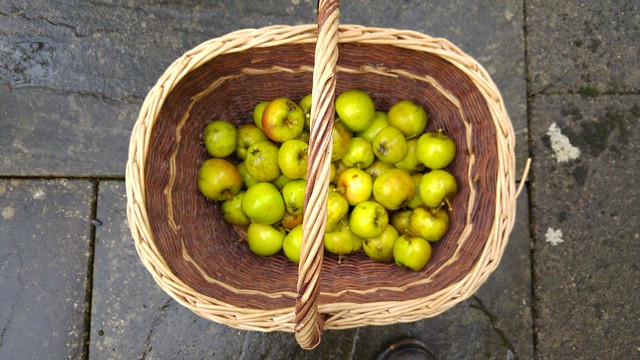Words for apples and related words, in Celtic languages.
| Proto-Celtic | *abalom = apple *abalnā = apple tree |
|---|---|
| Gaulish | abalon, aballon = apple, apple tree |
| Old Irish (Goídelc) | ubull, uball [ˈu.vul͈/ˈu.val͈] = apple aball = apple tree |
| Irish (Gaeilge) | úll [uːl̪ˠ] = apple; ball-and-socket joint; globular object, ball úllach = bearing apples, abounding in apples úllachán = little apple, little ball (of thread, etc) úlllgharraí, úllghort, úllord = orchard úllghlas = apple-green úll óir = golden apple, precious thing abhaill = apple tree fia-úll = crab-apple |
| Scottish Gaelic (Gàidhlig) | ubhal [u.əl̪ˠ] = apple ubhal-chrann, abhaill = apple tree ubhal-cridhe = tomato ubhal-fiadhain, fiadh-ubhal, searbh-ubhal = crab/wild apple (malus sylvestris) ubhal-ghort = apple orchard dearc-ubhal = oak apple lionn-ubhal = (apple) cider òr-ubhal = orange |
| Manx (Gaelg) | ooyl = apple, pommel ooylagh = orchard billey ooyl = apple tree ooyl feie = crab-apple ooyl ghraih = tomato ooyl ghraney, ooyl ghrineagh = pomegranate |
| Proto-Brythonic | *aβal = apple *aβaln = apple tree |
| Middle Welsh (Kymraec) | aual, aval, afal = apple auallen, avallen, yfallen = apple tree |
| Welsh (Cymraeg) | afal [ˈaval/ˈaːval] = apple afallen = apple tree afal cariad = tomato, love-apple afal cwins = quince afal drain = haw, hawthorn berry afal gwlanog = peach afal sur (bach) = crab apple |
| Cornish (Kernewek) | aval [ˈaval/ˈævɐl] = apple avalen = apple tree aval briansen = larynx aval dor = potato aval gwlanek = peach aval kerenja/kerensa = tomato aval lagas = eyeball aval paradhis = grapefruit aval saben = pine cone |
| Old Breton | abal = apple |
| Middle Breton | aval [ˈɑː.val] = apple |
| Breton (Brezhoneg) | aval = apple avalwez = apple tree aouraval = orange greunaval = pomegranate aval-douar = potato |
Etmology: possibly from the Proto-Indo-European *h₂ébōl (apple), which is also the root of words for apple in Baltic, Slavic, Celtic, Germanic and Italic languages [source].
Avalon, the legendary island in the west to which King Arthur was taken after the Battle of Camlann, probably comes from the same root, via the Latin Insula Avallonis – the name used by Geoffrey of Monmonth in his Historia Regum Britanniae (c. 1136). Avalon may have been the Isle of Man, or the Isle of Arran, which were known as Emain Ablach in Old Irish poems [source.
Words marked with a * are reconstructions.
Sources: Wiktionary, Am Faclair Beag, Online Manx Dictionary, Teanglann.ie, eDIL – Electronic Dictionary of the Irish Language, In Dúil Bélrai English – Old Irish glossary, Geiriadur Prifysgol Cymru, Gerlyver Kernewek, Dictionaire Favereau, TermOfis, English – ProtoCeltic WordList (PDF)
